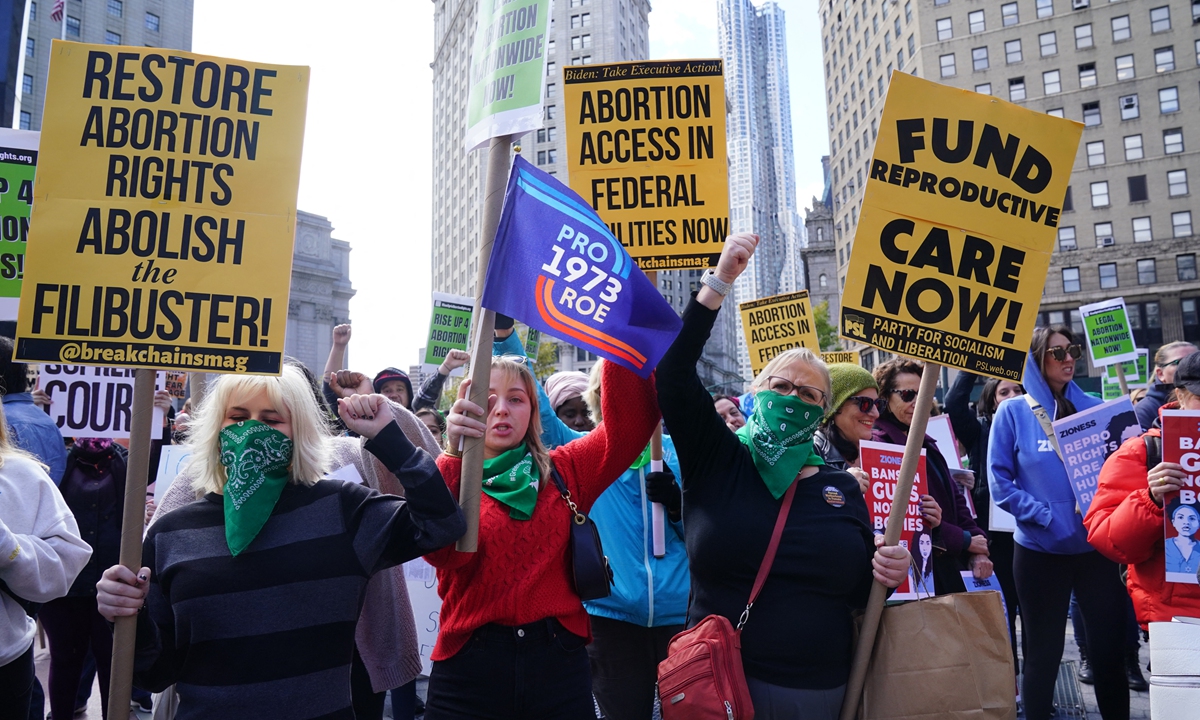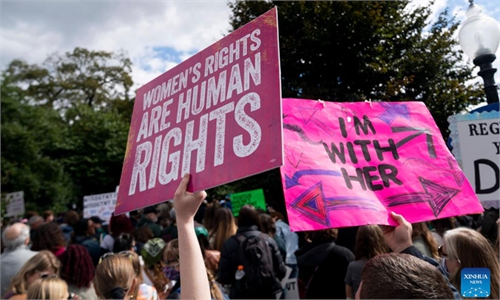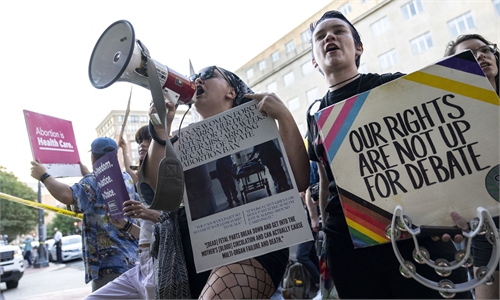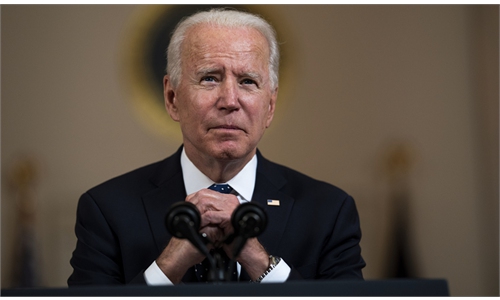Abortion of justice
Will the world abort women’s rights after death of Roe v. Wade?

Demonstrators hold up signs during a rally to defend abortion access and codify Roe v. Wade into law in Foley Square in New York City on October 8, 2022. Photo: AFP
Women and girls around the world will suffer a knock-on effect from the US decision to roll back abortion rights, experts say, predicting a global clampdown on hard-won female freedoms.From access to abortion to voting rights, equal pay to equal status, women from Africa to Asia to Europe are expected to feel the fallout of the US decision to reverse Roe v. Wade.
"You have heard the term that when the US sneezes, the rest of the world catches a cold," said Jade Maina, executive director of Trust for Indigenous Culture and Health, a health advocacy group based in Nairobi.
"This is what we are anticipating."
She spoke as healthcare experts and advocates for women gathered in Thailand for a global family planning conference where the US high court ruling was a key topic of debate.
"Most of the time, the US is seen as progressive and is seen as the leader, and if the leader is going backward, so do the people following," she told the Thomson Reuters Foundation at this week's meeting.
The Supreme Court's June ruling could restrict women's health services, drive up rates of maternal mortality and influence laws in countries where reproductive policies are in question, according to attendees from more than 125 nations.
The top US court overturned women's right to an abortion nationwide - a move that will ricochet well beyond the world of pregnancy and outside of US borders, they said.
First off - money, with health funding now under threat.
The US is unrivaled in its financial clout as the world's largest donor to family planning and reproductive health services, averaging about $600 million a year in funding, according to the Kaiser Family Foundation, a US nonprofit.
The court ruling will bleed into healthcare policy, too.
"What the US does often has global repercussions, whether it's positive or negative," said Samukeliso Dube, the South Africa-based executive director of FP2030, a global family planning advocacy group.
Nor will it stop with issues around pregnancy, she said, citing high concerns about its impact on wider female rights.
When the US Supreme Court decision was handed down, the UN refugee agency, the UNHCR, called it "a huge blow to women's human rights and gender equality."
In its wake, 13 of 50 US states have banned or severely restricted abortion access, and another 10 are expected to make similar moves in coming months, according to the New York-based Center for Reproductive Rights, a legal advocacy organization.
Some ramifications - intended and otherwise - will take time to drip down, said Gilda Sedgh of the Guttmacher Institute, a New York-based reproductive rights organization.
But she said its influence might well slow a liberalization of abortion laws in Latin America or the rollout of services in Northern Ireland, where abortion is legal but hard to get.
'Global gag rule'
Clues to other consequences can be seen in the effects of the so-called global gag rule that bans US-funded groups working abroad from discussing abortion, the experts said.
The rule has flipflopped since the 1980s, dependent on the US politics of the day.
It requires groups working overseas to accept restriction or reject it and lose funding, and it has forced the shutdown of clinics and services reliant on US aid in dozens of countries.
Under former Republican president George W. Bush, research published in The Lancet from 26 African countries found the global gag rule had led to a 14 percent drop in modern contraception use and a 40 percent rise in abortions, most of them likely unsafe.
After former president Donald Trump reinstated the rule, healthcare services to poor and marginalized women were slashed by up to 42 percent among the more than 50 healthcare projects in 32 countries overseen by the International Planned Parenthood Federation.
In Kenya, the effect of the gag rule under Trump was "chilling," Maina said.
Shuttered clinics meant no reproductive health care - but also curtailed treatment for common infant diseases, she said.
"Services went from being very available to very scarce and only for pay," she said.
Democratic President Joe Biden repealed the global gag rule soon after taking office in 2020. The next presidential vote, which could pick an anti-abortion president, is two years away.
A key legal decision banning abortion-related criminal prosecutions in Kenya earlier in 2022 could be affected by the new US position on abortion, Maina said.
The ruling by a Kenyan high court cited Roe v. Wade in its legal reasoning but since the June rollback, a conservative Christian group has filed an appeal, she said.
And if Kenya does follow suit and restricts abortion, "what we'll see is increased maternal mortality," she added.
Abortion is permitted in Kenya in cases of rape and if the woman's health or life is at risk.
Reuters



